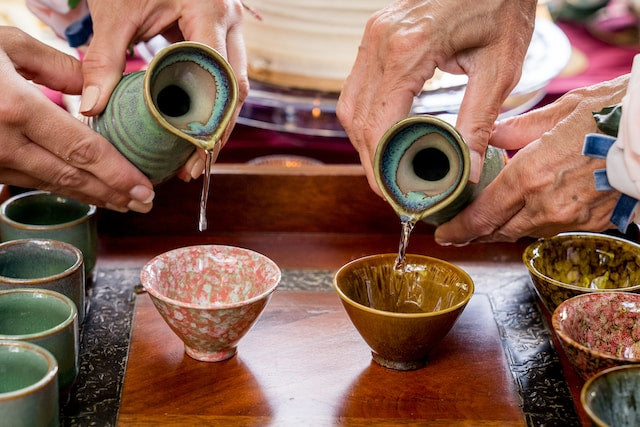The sake ritual is a traditional Japanese ceremony that involves the offering and consumption of sake. The ritual is typically performed at special occasions, such as weddings, festivals, and religious ceremonies. Sake is considered to be a gift from the gods, and the ritual is a way of showing gratitude and respect to the divine. The ritual is also a way of bringing people together and celebrating special moments. Sake has a long history of being used as a communication tool between humans and gods in Japanese culture. It was offered to the gods to appease their anger, pray for blessings, and thank them for bountiful harvests. The Japanese believed that drinking sake offered to the gods would bring them closer to the divine.
How closely is Sake tied into the Japanese culture?
Inseparable from two of the most prominent Japanese religions- Buddhism and Shintoism, the ceremonious drink is brewed even in the premises of the Buddhist and Shinto leaders. Scattered across the country are over 40 shrines and more than 55 gods related to sake. Some even known to worship the ingredients or the brewing water. The 3 most prominent ones being Oomiwa Shrine, Umemiya Shrine and Matsuo Shrine. Oomiwa Shrine, is located in the sacred Mount Miwa. The entire mountain is revered as the god of sake.


Festivals, rituals and personal milestones
Kagami-biraki is a traditional Japanese ceremony that involves the ceremonial opening of a sake cask. It is typically performed at formal celebrations such as opening ceremonies, company parties, election victories, and wedding ceremonies. The circular wooden lid of the barrel is called kagami, which means "mirror" in Japanese. The mirror symbolizes peace and good fortune. By hitting the cover with a wooden mallet, opening the mirror brings blessings of health, prosperity, and happiness. The sake is then shared among the assembled. Kagami-biraki is a centuries-old tradition that is still practiced today. It is a way of celebrating special occasions and bringing people together.
Real estate
In Japan, when construction begins on a new house, a Shinto priest performs a ceremony called a Jichinsai to pray for the safety of the building and to soothe the land god. The priest pours sake on the ground where the building will stand as an offering to the gods.
Weddings
In a Japanese wedding ceremony, the bride and groom drink sake in a ritualized ceremony called san-san-ku-do “three times three exchange”. The couple sips three times from three sake cups (sakazuki) in different sizes, starting from the smallest. The three sips represent the three treasures of life: heaven, earth, and man. The three sake cups represent the three stages of life: youth, adulthood, and old age. The couple's exchange of sake cups represents their promise to share their lives together, from youth to old age.


The New Year
1st is the biggest and most important event of the year. It is a time for renewal and for celebrating the coming of the New Year. One of the most important traditions of New Year's Day in Japan is the drinking of toso. Toso is a sake or mirin infusion that is made with herbs such as cinnamon, rhubarb, and sansho (Japanese pepper). The toso is traditionally drunk by the entire family. The youngest member of the family drinks first, and then passes the cup to the next oldest member, and so on, until the oldest member drinks last. This tradition is believed to symbolize the passing of joy and good fortune from the young to the old.
Momono sekku, Girls’ Day
Hinamatsuri, also known as Doll's Day or Girls' Day, is a Japanese festival celebrated on March 3rd. It is a day to pray for the health and happiness of girls. Families with daughters display ornamental dolls dressed in traditional Heian court attire on a tiered platform. While children cannot drink alcohol, adults typically drink a special sake called shirozake on Hinamatsuri. Shirozake is a sweet, milky sake that is made from fermented rice. It is believed to bring good luck and happiness to girls. Host your very own evenings of sake and celebration.


